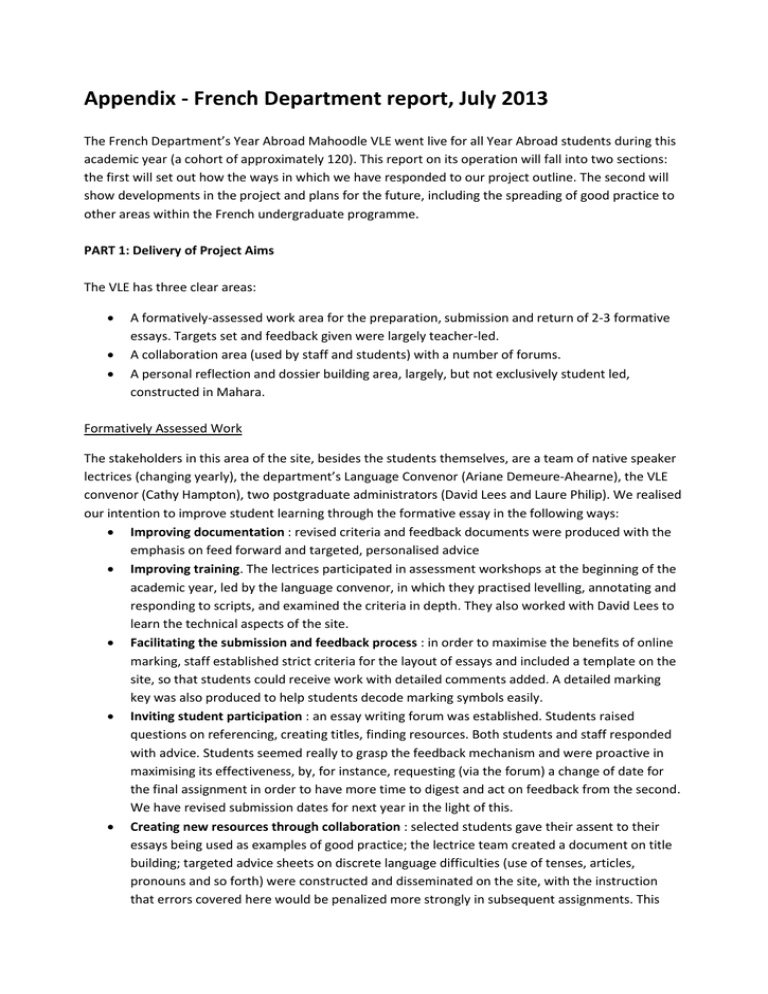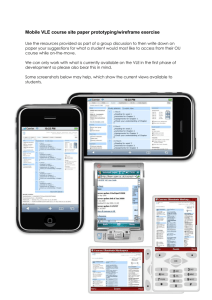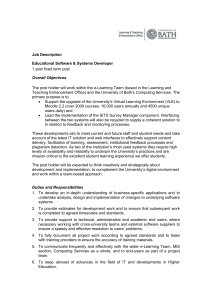Appendix - French Department report, July 2013
advertisement

Appendix - French Department report, July 2013 The French Department’s Year Abroad Mahoodle VLE went live for all Year Abroad students during this academic year (a cohort of approximately 120). This report on its operation will fall into two sections: the first will set out how the ways in which we have responded to our project outline. The second will show developments in the project and plans for the future, including the spreading of good practice to other areas within the French undergraduate programme. PART 1: Delivery of Project Aims The VLE has three clear areas: A formatively-assessed work area for the preparation, submission and return of 2-3 formative essays. Targets set and feedback given were largely teacher-led. A collaboration area (used by staff and students) with a number of forums. A personal reflection and dossier building area, largely, but not exclusively student led, constructed in Mahara. Formatively Assessed Work The stakeholders in this area of the site, besides the students themselves, are a team of native speaker lectrices (changing yearly), the department’s Language Convenor (Ariane Demeure-Ahearne), the VLE convenor (Cathy Hampton), two postgraduate administrators (David Lees and Laure Philip). We realised our intention to improve student learning through the formative essay in the following ways: Improving documentation : revised criteria and feedback documents were produced with the emphasis on feed forward and targeted, personalised advice Improving training. The lectrices participated in assessment workshops at the beginning of the academic year, led by the language convenor, in which they practised levelling, annotating and responding to scripts, and examined the criteria in depth. They also worked with David Lees to learn the technical aspects of the site. Facilitating the submission and feedback process : in order to maximise the benefits of online marking, staff established strict criteria for the layout of essays and included a template on the site, so that students could receive work with detailed comments added. A detailed marking key was also produced to help students decode marking symbols easily. Inviting student participation : an essay writing forum was established. Students raised questions on referencing, creating titles, finding resources. Both students and staff responded with advice. Students seemed really to grasp the feedback mechanism and were proactive in maximising its effectiveness, by, for instance, requesting (via the forum) a change of date for the final assignment in order to have more time to digest and act on feedback from the second. We have revised submission dates for next year in the light of this. Creating new resources through collaboration : selected students gave their assent to their essays being used as examples of good practice; the lectrice team created a document on title building; targeted advice sheets on discrete language difficulties (use of tenses, articles, pronouns and so forth) were constructed and disseminated on the site, with the instruction that errors covered here would be penalized more strongly in subsequent assignments. This multi-layered feedback system seemed to generate a much more focussed interest in the benefits of these formative assignments than had hitherto been the case when students submitted and had marks returned by post.. Personal reflection and dossier building Students were asked to build non-assessed dossiers of resources for their essays, and for final-year language work, on topics of their choice, using the Mahara multimedia space. Many students struggled to use Mahara, despite being provided with instructions for use in form of screen captures, videos and word documents, as well as examples from a previous pilot study for the VLE. They also received some training in usage of the site prior to their Year Abroad. Nevertheless, once abroad many students felt that Mahara was not intuitive enough to be readily usable: Facebook postings (students gave me access to the French Year Abroad Facebook page they formed), emails and end-of-year questionnaires revealed problems with logging in and confusion about the different discrete areas of the combined Moodle / Mahara platform about which it was difficult to offer sufficient reassurance at a distance. There was also a tendency for users to see the pages as something of a scrap book for resources. Mahara offers the facility for students to share their pages with others, and we encouraged critical appraisal of pages through a comments facility. 16 students in a cohort of about 120 shared their pages, allowing staff to offer advice on copyright issues and the web, on layout and on reflective appraisal of content, distributed to individual students and, more generally, through the Moodle forums. The best of the pages, responding to advice given, showed an excellent level of reflection, incorporating critical discourse on the choice of content, a sifting and sorting of materials through target language summaries and key vocabulary lists, and a sensitivity to presentation. In summary, though the dossier task itself had been broken down into a number of objectives, many of these were more directly focussed on the process of choosing topics; it was clear that we had underestimated the need to scaffold the presentation process in order to engender high level critical engagement with the material students had chosen. Basing our scaffold upon best student practice, we have worked with Rob O’Toole to devise a new dossier area on the Warwick Sitebuilder interface that ties the uploading of content directly to critical appraisal of it through mandatory web forms setting explicit tasks (such as: ‘draw up a list of new vocabulary’; ‘explain why you have chosen this article’). We intend to try this interface during the next academic year and to compare its usage with the previous Mahara platform. Collaborative forums The Moodle forums saw the most productive combination of teacher-led scaffolding and student driven activity in which students clearly ‘internaliz[ed] the teaching role’ (Kear, 2011, p. 43).i In order to galvanize the disparate community at the beginning of the academic year, the decision was taken to have a programme of seeded activities which students could opt into, combined with a termly compulsory posting. Laure, a native speaker, was asked to seed and monitor the site on a very regular basis. Other staff also participated in the process. The seedings ranged from the very informal (virtual cinema and reading clubs, recipe sharing, description of regions) to those requiring reflection on language and interculture, to others focussing clearly on professional and academic skills building. The contributions to the forums show students-as-teachers engaging in high level critical reflection on their roles and adopting a transactional approach to problems and questions. They adopted the roles of producer (seen in an unsolicited student post inviting other students to gather resources for the department’s yearly Year Abroad talk), task manager (seen in a lively peer discussion on how to solve the fear of speaking French in public), and workplace professional. This professionalization of their roles was encouraged through the establishment of three ‘professional’ forums (the Assistantship forum, the Erasmus forum and the Paid Work forum). Contributions to these forums were set as compulsory, and students asked to reflect on their work role, by offering sample material (lesson plans, assessment of pupil need; how to integrate at university, which courses to recommend; reflection on expectations in the workplace). The most inspiring posts produced in-depth analysis of intercultural exchange, learning dispositions and classroom, university and workplace behaviours. A questionnaire on forum use made it clear that despite the existence of a parallel Year Abroad Facebook page, students had particular faith in the academic and pastoral aspects of the VLE: ‘It is a place to ask academic questions and to gain reputable advice (either from other students experiences, or in terms of recommendations)’ ‘I have so many Facebook groups for various year abroad criterion [sic] it's comforting to know that there is a direct link to all other Warwick students and teachers.’ Other resources Careers page : this page invites students to reflect on the skills and dispositions acquired on the Year Abroad by presenting them with some meta-cognitive critical reflections on 21st century learning, with sample job specs setting out the kind of skills valued by employers, and with lists of key skills Blogs : a ‘blog of the week’ prize was given to the best contributors, which were gathered together in a single space. Kaltura video assignment package added to moodle page. This has enabled me to set a video activity for returning students, asking them to record a personal reflection on the Year Abroad that might be used at open days or for widening participation purposes. I await the results ! Dissemination We presented papers on the site as follows: LLAS subject centre conference, Edinburgh, July 2012 Residence Abroad, Social Networks and Second Language Learning, Southampton, April 2013 Warwick Teaching and Learning Showcase, June 2013 I have submitted a paper to be considered for publishing in the conference proceedings: Residence Abroad, Social Networks and Second Language Learning (provisional title) to be published in the Eurosla Monographs series. PART 2: Project Developments Student centred Formative Assignments Drawing on the success of the collaborative aspects of the site and the evident desire of students to contribute to an ongoing body of learning about the Year Abroad, we will replace the third formative essay with an assignment that asks students to build a body of resources, in French, intended for an outgoing Year Abroad student. Students will be able to choose from a number of topic areas, but will be directed towards reflection upon an aspect of their own Year Abroad role (drawing on their experiences as assistants, Erasmus students and paid workers; on their relationship with local communities , and so forth) The resources will be made available to future Year Abroad students , and it is hoped that this will help students embed good practices on the YA. Preparatory Workshop In addition to the workshops that currently introduce students to the technical aspects of the VLE, we have initiated a new workshop on content preparation that focuses on the task of choosing and designing titles for the YA essays and third assignment. This workshop, created in response to anxieties about title creation articulated in this year’s forum, ran successfully in May 2013. One final-year student helped lead the session; it is hoped that more finalists can be encouraged to participate next year. VLE expansion Alongside the YA moodle, I began using Moodle in core first-year modules which I convene. Moodle has successfully been used in the first-year grammar and core text modules. The grammar VLE will be used by all tutors next year, where more experimentation with voice and video tools are anticipated. The text module VLE has been used successfully to stream set films through Kaltura, and will be used more extensively in this area next year. With the repository that the language centre moodle offers us, students will be able to work on selecting, critically examining and uploading film extracts for the first time (because these are now copyright covered on the site). These two sites will also incorporate Mahara reflection areas. I am keen to initiate e-portfolio reflections in core modules, and to build the habit from the first year. I believe the open nature of Mahara will dovetail well with the creative, exploratory nature of these reflective spaces, and the skills involved in using the Mahara facility, which duplicates the kind of web interfaces that students may encounter later in the work place, will be able to be built in a supportive face to face environment. The librarian responsible for the French department has also shown some interest in participating in this endeavour. Redesign of web pages Following a recruitment process, a current Year Abroad student, Claire, has been employed to review and redesign aspects of the YA VLE alongside David Lees. Claire has reviewed and collated the collaborative material on the site, and is currently creating resources for outgoing students from this, including fact sheets on regions, practical advice (on administration, budgeting, and so forth), and lists of contacts (so students can speak to a returning student placed in the same region / school / university). With David she has reorganised the layout of the site to make it much more visually appealing and user friendly. The site will be available for this year’s outgoing students from the end of July. Claire’s interventions have proved so useful that we believe it would be fruitful to build a URSS project around this activity next year. Interaction with the Student Mentor scheme The current online scheme offers students virtual training before they become mentors. Many YA students feel they have much to offer here, and we are looking to capture this enthusiasm by making links between this site and the YA VLE. New IATL project Building on collaborative and contribution models of learning for global citizenship, we have won funding for a Student as Producer project involving 15 students. This project focuses on widening participation, and will involve students gathering and peer reviewing artefacts that might profitably be used to stimulate learning in the year 9 French classroom (using Moodle forums and other online spaces to compare materials), to be developed for use in local schools on their return. Students have already visited local schools and reviewed learning materials currently available in preparation for this. Staff centred Inter-institutional collaborative work Following networking at the conferences mentioned above, we have developed links with other HE MFL departments also seeking to enhance YA learning through digital spaces. Newcastle, Southampton and Reading universities are currently involved. We met virtually at Christmas using Blackboard collaborate, and now plan jointly to run a workshop session at the forthcoming LLAS annual e-learning symposium (Southampton: January 2013). I’ve also established connections between Fiona Kent, our careers advisor, and a Southampton academic working on YA skills development. Staff development At our recent staff teaching away day I ran a session on the facilities offered by the language centre moodle and offered some training in its use. Staff were particularly interested in the possibilities offered by the Kaltura video facility and repository for transmitting film and TV, which has huge potential in the area of language teaching and in the teaching of contemporary content modules. Further training will be offered in the Autumn term; staff have been encouraged to try incorporate discrete VLE activities such as these by embedding a moodle within Sitebuilder-based modules. i Kear, K. (2011) Online and Social Networking Communities, New York and London, Routledge.




